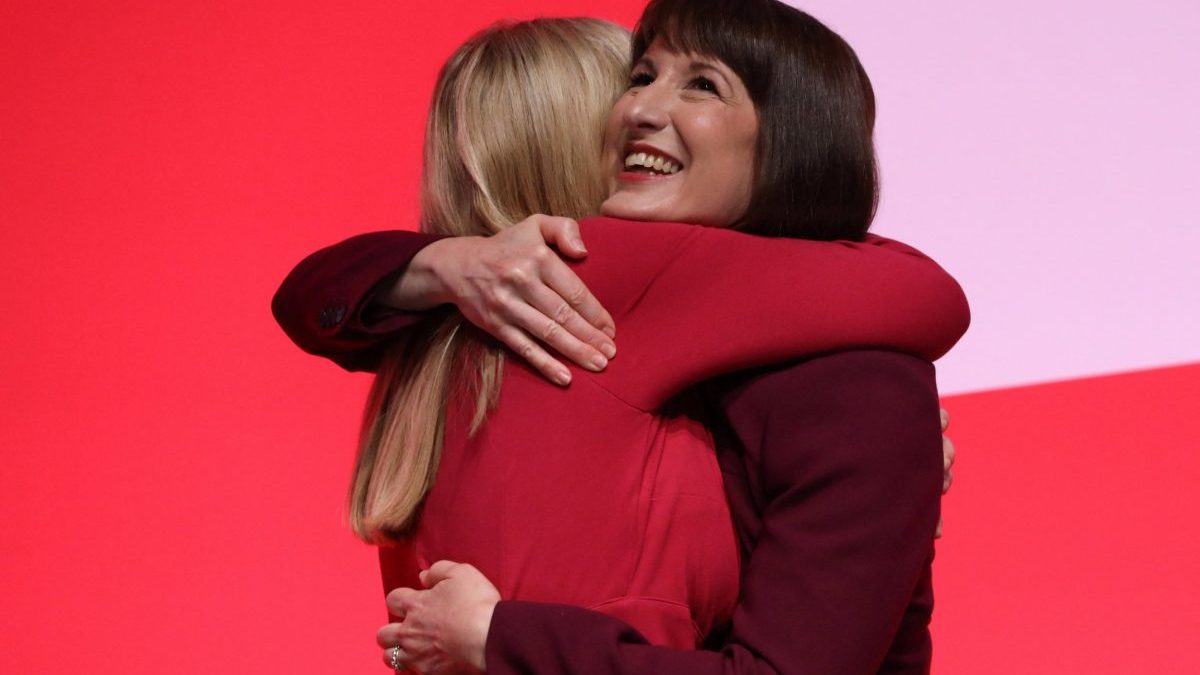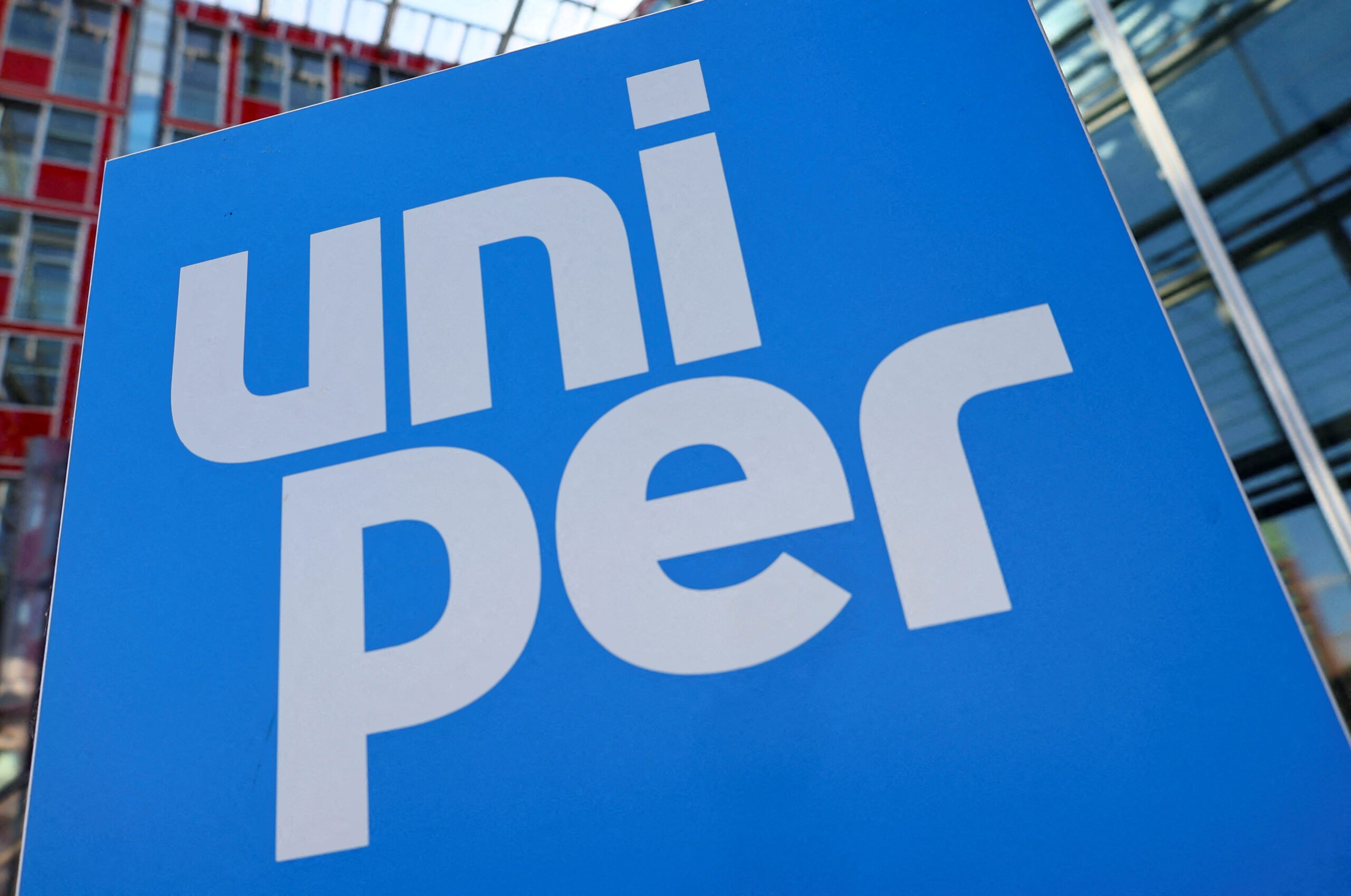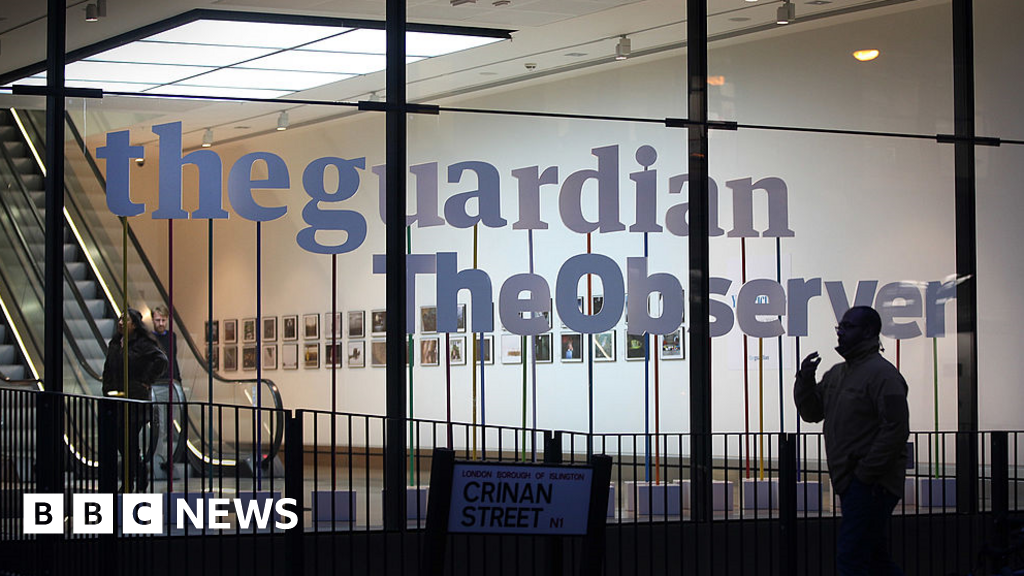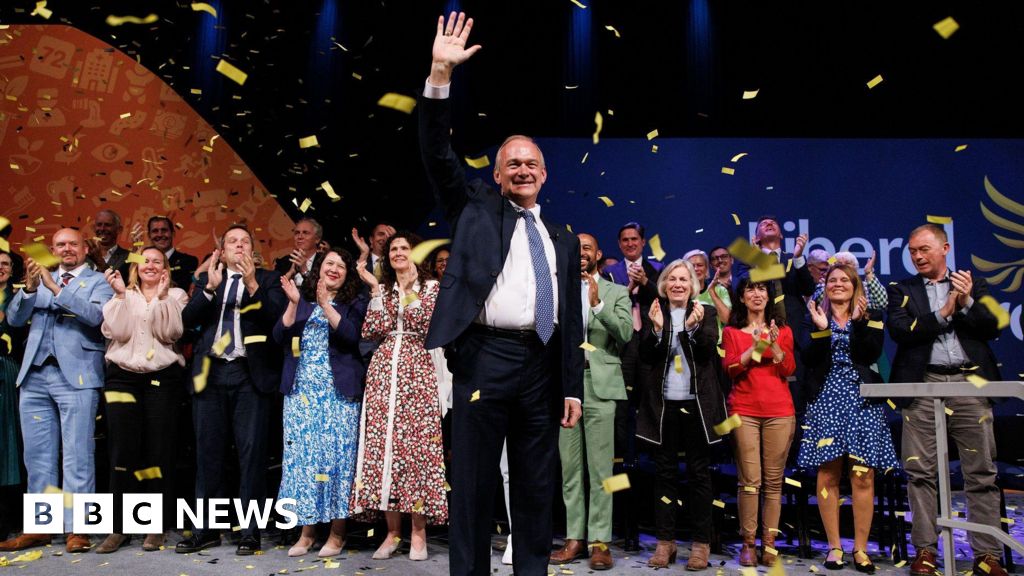Reuters exclusively reported that legacy gas contracts with former main supplier Gazprom could become a key hurdle for utility Uniper in its attempts to return to the stock exchange following its 13.5 billion euro bail-out by the German government during the height of Europe’s energy crisis.
News
Reeves gets rapturous reception – but reveals nothing


Rachel Reeves’s keynote conference speech was not the pivot away from the doom-mongering that Labour’s critics were looking for. Amid a lot of smiling from the Chancellor of the Exchequer, there were no big policy announcements and a lot of pitch-rolling for next month’s “difficult” – read, grim – Budget.
Her first conference speech as Chancellor represented a balancing act. She needed to talk up the dire state of public finances ahead of tax rises in the Budget, while not undermining the prospect of growth – all the while presenting a more optimistic story for voters questioning whether Labour will make the difference it promised. She also needed to reassure both workers and employers that she is on their side. Such things have sunk lesser politicians.
Reeves, who has given the impression of cosplaying George Osborne for the past couple of months, metaphorically shrugged off the high-vis jacket favoured by the former Tory chancellor.
She explicitly rejected the label of austerity coming down the track at the Budget, although this may turn out to be semantics with cuts to government spending yet to be laid out. In fact, she almost contradicted herself with her next sentence, adding: “We must deal with the Tory legacy – and that means tough decisions.”
But Osborne had one advantage that Reeves does not: his running-mate. Back in the Noughties at the height of playing austerity bad cop, Osborne had hug-a-husky, sunlit-uplands David Cameron beside him making the argument for a “Big Society” of charitable enterprise taking the place of state spending.
Reeves, who believes in the state as the “backbone” of a fairer society, seems condemned to deal with the problems as she has been handed them, rather than make a change of argument to suit her. With Sir Keir Starmer alongside her, being all Mr Harbinger of Doom, there is no light and shade, just gloom.
Osborne, with his waspish wit and often unseen charm, suffered a public image problem. Reeves, with her raucous laugh and genuine kindness in private, suffers from a stiffness in public.
But occasionally there are flashes of defiance worth relishing. Interviewed on BBC Radio 4’s Today programme this morning about the freebies she had been receiving, she brought interviewer Nick Robinson down with a bump after pointing out that he had enjoyed the same hospitality.
Even though the party won the election, you wouldn’t necessarily think it in Liverpool. Until Reeves’s speech, the Labour conference had the same level of fizz as a bottle of pop left out overnight.
Bewildered and irritated that their hard work on the campaign had been overshadowed by a row about who had bought Reeves and Starmer their new clothes, one delegate put their head to one side in puzzlement and remarked to i: “I just thought they’d be a bit… better.”
“Where is the big retail announcement?” one new MP asked on Sunday upon arrival at the conference. Another looked at the pouring rain and said: “Is this it?”
Reeves’s speech was key to changing that narrative.
Feeling grim at endless headlines discussing whether Deputy Prime Minister Angela Rayner deserves a vanity photographer at taxpayers’ expense, by Sunday activists – and even some ministers – privately started talking about a “hostile media”. That’s a hoary old Jeremy Corbyn-era party catch-all which basically means: write about what we want you to write about, rather than point out our shortcomings.
By Monday, the mood of the conference had shifted as the number of business delegates outstripped party members. The rain-drenched queue snaked around the block to get in. According to a party source, tickets for business day sold out in 45 minutes. “We should have done dynamic pricing, like Oasis tickets, and got the prices up,” one aide joked.
For ministers, business day is like the TV game show Gladiators, dodging over-eager lobbyists armed with sharpened business cards. Some Labour MPs even arrived to find that their hotel rooms had been given away to a public relations firm, which went down as well as one would imagine.
The highlight of the day was Reeves’s keynote speech. There was a genuinely moving movement when she reflected on the historic achievement of becoming the first female Chancellor of the Exchequer in the office’s 800-year history.
But the main auditorium is still the domain of the party faithful. It was not surprising then that in the hall when Reeves mentioned adding VAT to the school fees of private school children, it got the biggest cheer; the packed loyalists were reminding themselves that despite the Hobbs aubergine trouser suit, Reeves is still one of them.
One of the loudest “woos” from the crowd came when she talked about the “first Labour Budget in 14 years”. That “woo” may turn out to be badly misplaced. Reeves is not joking when she says that it is going to be “difficult” at the Budget next month. She seemed to tackle that head on, making an argument about the necessity of making controversial decisions overall.
“I know that not everyone in this hall or in the country will agree with every decision that I make,” the Chancellor said. “But I will not duck those decisions, not for political expediency, not for personal advantage. I did not take those decisions lightly; I will never take the responsibility of this office lightly.”
Reeves also echoed two Gordon Brown speeches. In his first conference speech as chancellor in 1997, Brown told delegates pushing for increased public spending that a “new Jerusalem” could not be built on a “mountain of debts”.
She also borrowed from his last day as Prime Minister in 2009 when he reeled off a list of what he saw as the New Labour governments’ achievements, concluding: “That’s the Britain we’ve been building together.” Brown, who visited the Treasury recently, would surely approve.
Reeves’s speech appeared to be what conference needed. Someone had clearly told her to e-nun-ci-ate, so her words came out with a new, rather disconcerting pre-cis-i-on. But she won the hall over.
That was needed on the day that the leadership is facing a non-binding but nevertheless embarrassing vote from unions to abandon its policy to means test the winter fuel grant for pensioners. She managed to rescue the Labour conference conversation from one of is-this-it to bridge-to-the-future.
After a successful major conference speech, Brown would take hours to come down from the adrenaline high. Afterwards, towing her sister Ellie Reeves, the Labour Party chairman, the Chancellor swept from the hall.
She almost crowd-surfed the rolling tide of congratulations from Labour delegates as she moved on to her next meeting, with a broad smile on her face as she accepted the plaudits but not the proffered business cards.
Reeves had run the gauntlet of the business and party faithful and survived. She might even have changed the narrative of this conference away from suits, dresses and freebies.
But this speech was a staging post: everyone is just waiting until the Budget.
Business
Uniper’s dormant Russian gas contracts may pose hurdle to listing

Energy
03 May 2024, 3:26 am 1 minute
Market Impact
The expected re-IPO of Uniper could become one of Germany’s biggest listings in 2025 and would mark a major milestone for Berlin following Uniper’s nationalization in 2022, making it a key strategic issue for utility investors.
Article Tags
Topics of Interest: Energy
Type: Reuters Best
Sectors: Commodities & Energy
Regions: Europe
Countries: Germany
Win Types: Exclusivity
Story Types: Exclusive / Scoop
Media Types: Text
Customer Impact: Significant National Story
News
Moment 'moron driver' screeches around Batley in Bentley with public furious


Other drivers have condemned the actions of the motorist
Business
Boeing union hits out over ‘final’ 30% pay rise offer

The union representing thousands of striking Boeing workers has hit out at what the aircraft manufacturing giant called its “best and final” pay offer, which proposed a 30% rise over four years.
The new offer also included the reinstatement of a performance bonus and improved retirement benefits.
However, the International Association of Machinists and Aerospace Workers (IAM) said the offer was not negotiated with the union and that “it was thrown at us without any discussion.”
More than 30,000 Boeing workers went on strike earlier this month after rejecting a 25% pay rise offer.
“After listening to our employees and their concerns, Boeing today presented our best and final offer,” the aircraft manufacturing giant said in a letter sent to union officials.
The proposal doubles the value of a one-off bonus for signing a new pay deal to $6,000 (£4,497).
Boeing said the offer is dependent on it being ratified by union members by midnight pacific time on Friday 27 September (7am GMT on Saturday 28 September).
But IAM said Boeing sent the new offer directly to union members and the media without telling the union’s representatives.
“This tactic is a blatant show of disrespect to you – our members – and the bargaining process,” IAM said in a post on X, formerly known as Twitter.
The union also said it would not hold a vote of its membership ahead of Boeing’s deadline.
BBC News has asked Boeing for a statement on IAM’s response to its new pay offer.
Boeing workers voted to strike on September 13 after rejecting a new contract deal, which included a 25% pay rise over four years.
The union had initially aimed for a number of improvements to workers’ packages, including a 40% pay rise.
Almost 95% of the union members – who produce planes including the 737 Max and 777 – voted to reject Boeing’s initial offer.
Of those who voted, 96% backed strike action until a new agreement could be reached.
The strike threatens to cost Boeing billions of dollars, deepening the crisis at a company already facing significant challenges.
Its impacts are already being felt across the industry and wider US economy too, as Boeing has halted shipments of most parts and taken other steps to save money.
The company has already suspended the jobs of tens of thousands of staff.
It has also said that US-based executives, managers and staff would be asked to take one week of furlough every four weeks for as long as the walkout lasts.
Government officials are now helping to mediate talks between the two sides.
News
How to eat carbs without spiking your blood sugar, according to a nutrition researcher

-
Eating carbs with protein, fat, and fiber can help promote more stable blood sugar.
-
How you eat also matters, and eating more slowly and early in the day can prevent blood sugar spikes.
-
Other healthy habits like getting enough sleep are crucial for balanced blood sugar.
You don’t have to cut out carbs to balance your blood sugar for better health and energy, according to a top nutrition researcher.
It’s not just what you eat, but how you eat that matters when it comes to reducing blood sugar dips and spikes, according to Sarah Berry, professor at King’s College in London and chief scientist at ZOE, a personalized nutrition and health science company.
While a rise in blood sugar after eating carbs is natural and not necessarily a problem, Berry said, having blood sugar that’s too high or too low can increase inflammation, raising the risk of chronic disease and other health problems, research suggests.
“Our bodies are so clever, we have all of these different things in place to be able to handle that. But if this happens repeatedly and excessively, that’s when then it becomes a problem,” Berry said.
Dramatic fluctuations in blood sugar can also leave you feeling “rubbish,” she said, leading to afternoon slumps, cravings, and brain fog.
The latest science suggests a few tweaks to your routine may help you prevent blood sugar spikes and drops without cutting out carbs.
“It doesn’t mean you need to obsess about it, but it means you can be slightly more aware about it and be more aware about how you partner your foods, when you eat your foods and those kinds of things,” Berry said.
Combine your carbs with nutrients like protein or healthy fat
You can still eat your favorite carbs, from pasta to bread, but the key to making them healthier is what you add to the meal or snack, dietitians previously told Business Insider.
Take breakfast as an example, Berry said.
If you’re having a bagel, pairing the carbs with protein or healthy fats, like cheese or other nutrient-rich toppings (think salmon and veggies, for instance) can reduce your blood sugar response and help you feel better after eating.
“You stay fuller for longer and that’s what’s important,” Berry said. “Carbohydrates can be a really fabulous part of our diets, particularly if they’re high in fiber. But just make sure you are having plenty of protein and healthy fats with it at the same time.”
Choose high-fiber carbs like whole grains and berries
The type of carbs you chose can also influence your blood sugar response.
Foods that are high in fiber help to slow digestion, which means your blood sugar won’t rise as quickly or crash later, dietitian Bonnie Taub-Dix previously told Business Insider.
Add more fiber to your diet by adding nuts and seeds to your snacks, using whole grain bread for sandwiches, loading up on chickpeas or other beans (especially in pasta), and eating fiber-packed fruits like strawberries and blueberries.
Slow down and enjoy your food
Wolfing down your food can lead to bigger spikes in blood sugar and over time, is also linked to weight gain, research suggests.
“We see that if you eat your food more quickly, you have a higher blood sugar, you have a higher body weight,” Berry said.
To level out your blood sugar, take time to enjoy your food without rush or distraction, chowing down in front of the TV, or racing to finish your meal.
Eat earlier in the day (and avoid nighttime snacking)
Some of the research Berry is most excited about suggests that when you eat matters for blood sugar, too.
A recent ZOE study found that people had a more moderate response in blood sugar when they ate a meal for breakfast, but a larger blood sugar response to the same meal when they ate it later in the day.
That supports growing research that our circadian rhythm can affect our metabolism. Previous research suggests eating too late at night can set you up for higher risk of certain health issues, too.
“This fits in with the kind of data that we are seeing that people who are late night snackers tend to have a higher BMI tend to have poorer cardiovascular health, tend to have higher circulating blood glucose,” Berry said.
Take a short walk after meals
Another way to manage your blood sugar is to get moving, since exercise helps use up stored energy and makes you more sensitive to insulin, the hormone that regulates blood sugar.
One study found that walking for just two to five minutes after you eat can lower your blood sugar.
Get enough sleep (seriously)
No, you’re not dreaming — getting some shuteye can help you enjoy carbs more healthfully. That’s because too little sleep can raise your blood sugar. It can also make you more vulnerable to cravings and overeating, research suggests.
“If you have poor night’s sleep, you have a higher blood sugar response compared to if you have a good night’s sleep. So you set yourself up on this rollercoaster,” Berry said.
It’s a good reminder that blood sugar is about more than what we eat, but all our habits and even parts of our identity like age and sex can play a role.
“We are starting to get a beautiful puzzle coming together because what controls our blood glucose is so complex. It’s who we are, how we eat, how we feel, our lifestyle, et cetera,” she said.
Read the original article on Business Insider
Business
US prepares to sue Visa for alleged anti-competitive behaviour
Unlock the Editor’s Digest for free
Roula Khalaf, Editor of the FT, selects her favourite stories in this weekly newsletter.
The US Department of Justice is preparing to file an antitrust lawsuit against Visa, accusing the payments company of anti-competitive behaviour.
Federal prosecutors are set to file a lawsuit as early as Tuesday, said a person familiar with the matter. The move would come after a years-long review by the DoJ into Visa’s business practices.
The company in 2021 disclosed in a regulatory filing that the DoJ’s antitrust unit had requested information on potential violations of antitrust law provisions that outlaw anti-competitive agreements and monopolistic conduct. The civil probe focused on Visa’s debit card business in the US as well as competition in other networks and payment methods.
The company last year said federal prosecutors had sought additional documents as part of this investigation. Visa said it was co-operating with the DoJ and in 2021 said its “US debit practices are in compliance with applicable laws”.
The DoJ declined to comment. Visa did not immediately respond to a request for comment. The prospective lawsuit was first reported by Bloomberg.
Visa shares fell almost 2 per cent in after-hours trading.
It was not immediately clear whether the areas of interest Visa previously disclosed would be the focus of the DoJ’s upcoming enforcement action.
Antitrust agencies have also scrutinised Visa’s competitors. Mastercard last year reached an agreement with the US Federal Trade Commission to settle charges that the company illegally forced merchants to direct debit card payments via its payment network.
Visa and Mastercard earlier this year agreed to cut the so-called swipe fees they charge retailers in a legal settlement that merchants said would save them $30bn over five years, but the deal was later rejected by a federal judge.
Progressive antitrust officials in the Joe Biden administration have adopted tougher antitrust policy in an attempt to course correct what they have described as decades of lax enforcement.
Under the leadership of Jonathan Kanter, the DoJ’s antitrust division has pursued big cases attempting to curb powerful businesses including in Big Tech. The justice department is facing off against Google in a trial that accuses the company of monopolising the digital advertising space. It won a separate case against Google in which the company was branded a monopolist in online search.
News
Forced Labor Traps Adopted Children in Paraguay
675
On January 30, 2024, the Paraguayan news outlet El Surtidor published “Criadazgo: la explotación infantile atrapada entre las paredes del silencio” (“Criadazgo: Child Exploitation Trapped Between the Walls of Silence”), an article by Jamin Bazán about Paraguayan criadazgo, which is defined as forced domestic labor involving adopted children, without salary or adequate standard of living. Instituto Nacional de Estadisticas estimates that about 47,000 children, ages 5-17 (approximately 2.5% of Paraguay’s total population) are subject to criadazgo, working without adequate time to rest, appropriate pay, or opportunities to leave. Many of these are girls or young women who are, in some cases, sexually abused, and most of them keep silent about their situations. Currently, there is no legislation on this issue in Paraguay.
The focus on female adolescents and children affected by criadazgo is important. The article cites El Ministerio de Niñez y Adolescencia (the Ministry of Childhood and Adolescence) many times, but one of the most important statistics cited is that “el 76% de las afectadas eran niñas y adolescentes mujeres” (“76% of those affected were girls and adolescent women”). When considering that 76% of the 46,993 individuals affected by criadazgo are girls and women, this creates a need for programs and laws that fight against criadazgo. However, the programs that are currently being established are aimed at aiding children under the ages of 6 years and keeping vulnerable families from falling into the trap of criadazgo.
There is no coverage of this story in US corporate media, but there has been some coverage by Latin American news media. The BBC’s Spanish-language news outlet BBC Mundo published a report on criadazgo in 2016. A 2022 article from Paraguay’s La Nación illustrates the poverty of families in Paraguay and the reasons they have their children working in the first place. It also gives an example of children working on the streets and the dangerous consequences of doing so. Bazán’s report on criadazgo was also published by Uruguay’s La Diara. The limited reporting on the issue of criadazgo occurs in a context in which children’s rights organizations such as Plan International are seeking to draw attention to it.
Source: Jazmin Bazán, “Criadazgo: la explotación infantil atrapada entre las paredes del silencio,” El Surti, January 30, 2024.
Student Researchers: Eva Creighton, Mathias Lundgren, and Andrew McCleery (College of St. Benedict and St. John’s University)
Faculty Evaluator: Bruce Campbell (College of St. Benedict and St. John’s University)
-

 Womens Workouts8 hours ago
Womens Workouts8 hours ago3 Day Full Body Women’s Dumbbell Only Workout
-

 News5 days ago
News5 days agoYou’re a Hypocrite, And So Am I
-

 Sport4 days ago
Sport4 days agoJoshua vs Dubois: Chris Eubank Jr says ‘AJ’ could beat Tyson Fury and any other heavyweight in the world
-

 News2 days ago
News2 days agoOur millionaire neighbour blocks us from using public footpath & screams at us in street.. it’s like living in a WARZONE – WordupNews
-

 Technology6 days ago
Technology6 days agoWould-be reality TV contestants ‘not looking real’
-

 Science & Environment5 days ago
Science & Environment5 days agoHow to unsnarl a tangle of threads, according to physics
-

 Science & Environment5 days ago
Science & Environment5 days ago‘Running of the bulls’ festival crowds move like charged particles
-

 CryptoCurrency4 days ago
CryptoCurrency4 days agoEthereum is a 'contrarian bet' into 2025, says Bitwise exec
-

 CryptoCurrency4 days ago
CryptoCurrency4 days agoDZ Bank partners with Boerse Stuttgart for crypto trading
-
Travel1 day ago
Where Retro Glamour Meets Modern Chic in Athens, Greece
-

 Science & Environment5 days ago
Science & Environment5 days agoWhy this is a golden age for life to thrive across the universe
-

 Science & Environment5 days ago
Science & Environment5 days agoQuantum ‘supersolid’ matter stirred using magnets
-

 Science & Environment5 days ago
Science & Environment5 days agoSunlight-trapping device can generate temperatures over 1000°C
-

 Health & fitness6 days ago
Health & fitness6 days agoThe secret to a six pack – and how to keep your washboard abs in 2022
-

 Science & Environment5 days ago
Science & Environment5 days agoLiquid crystals could improve quantum communication devices
-

 CryptoCurrency4 days ago
CryptoCurrency4 days agoBitcoin miners steamrolled after electricity thefts, exchange ‘closure’ scam: Asia Express
-

 CryptoCurrency4 days ago
CryptoCurrency4 days agoCardano founder to meet Argentina president Javier Milei
-

 CryptoCurrency4 days ago
CryptoCurrency4 days agoDorsey’s ‘marketplace of algorithms’ could fix social media… so why hasn’t it?
-

 CryptoCurrency4 days ago
CryptoCurrency4 days agoLow users, sex predators kill Korean metaverses, 3AC sues Terra: Asia Express
-

 CryptoCurrency4 days ago
CryptoCurrency4 days agoBitcoin bulls target $64K BTC price hurdle as US stocks eye new record
-

 News4 days ago
News4 days agoIsrael strikes Lebanese targets as Hizbollah chief warns of ‘red lines’ crossed
-

 Science & Environment5 days ago
Science & Environment5 days agoHyperelastic gel is one of the stretchiest materials known to science
-

 Science & Environment5 days ago
Science & Environment5 days agoMaxwell’s demon charges quantum batteries inside of a quantum computer
-

 Science & Environment5 days ago
Science & Environment5 days agoQuantum forces used to automatically assemble tiny device
-

 News4 days ago
News4 days agoBrian Tyree Henry on voicing young Megatron, his love for villain roles
-

 Science & Environment5 days ago
Science & Environment5 days agoITER: Is the world’s biggest fusion experiment dead after new delay to 2035?
-

 Science & Environment5 days ago
Science & Environment5 days agoHow to wrap your mind around the real multiverse
-

 Science & Environment5 days ago
Science & Environment5 days agoPhysicists are grappling with their own reproducibility crisis
-

 Science & Environment5 days ago
Science & Environment5 days agoNuclear fusion experiment overcomes two key operating hurdles
-

 CryptoCurrency4 days ago
CryptoCurrency4 days agoRedStone integrates first oracle price feeds on TON blockchain
-

 CryptoCurrency4 days ago
CryptoCurrency4 days agoSEC asks court for four months to produce documents for Coinbase
-

 CryptoCurrency4 days ago
CryptoCurrency4 days agoVitalik tells Ethereum L2s ‘Stage 1 or GTFO’ — Who makes the cut?
-

 CryptoCurrency4 days ago
CryptoCurrency4 days agoBlockdaemon mulls 2026 IPO: Report
-

 Womens Workouts3 days ago
Womens Workouts3 days agoBest Exercises if You Want to Build a Great Physique
-

 Womens Workouts3 days ago
Womens Workouts3 days agoEverything a Beginner Needs to Know About Squatting
-

 Science & Environment1 day ago
Science & Environment1 day agoMeet the world's first female male model | 7.30
-

 Sport4 days ago
Sport4 days agoUFC Edmonton fight card revealed, including Brandon Moreno vs. Amir Albazi headliner
-

 Technology4 days ago
Technology4 days agoiPhone 15 Pro Max Camera Review: Depth and Reach
-

 Science & Environment5 days ago
Science & Environment5 days agoHow one theory ties together everything we know about the universe
-

 Science & Environment5 days ago
Science & Environment5 days agoLaser helps turn an electron into a coil of mass and charge
-

 Science & Environment5 days ago
Science & Environment5 days agoQuantum time travel: The experiment to ‘send a particle into the past’
-

 CryptoCurrency4 days ago
CryptoCurrency4 days ago2 auditors miss $27M Penpie flaw, Pythia’s ‘claim rewards’ bug: Crypto-Sec
-

 CryptoCurrency4 days ago
CryptoCurrency4 days agoJourneys: Robby Yung on Animoca’s Web3 investments, TON and the Mocaverse
-

 CryptoCurrency4 days ago
CryptoCurrency4 days ago$12.1M fraud suspect with ‘new face’ arrested, crypto scam boiler rooms busted: Asia Express
-

 Science & Environment5 days ago
Science & Environment5 days agoFuture of fusion: How the UK’s JET reactor paved the way for ITER
-

 CryptoCurrency4 days ago
CryptoCurrency4 days agoCertiK Ventures discloses $45M investment plan to boost Web3
-

 CryptoCurrency4 days ago
CryptoCurrency4 days agoVonMises bought 60 CryptoPunks in a month before the price spiked: NFT Collector
-

 CryptoCurrency4 days ago
CryptoCurrency4 days ago‘Silly’ to shade Ethereum, the ‘Microsoft of blockchains’ — Bitwise exec
-

 CryptoCurrency4 days ago
CryptoCurrency4 days ago‘No matter how bad it gets, there’s a lot going on with NFTs’: 24 Hours of Art, NFT Creator
-
Business4 days ago
How Labour donor’s largesse tarnished government’s squeaky clean image
-

 News4 days ago
News4 days agoBrian Tyree Henry on voicing young Megatron, his love for villain roles
-

 CryptoCurrency4 days ago
CryptoCurrency4 days agoCoinbase’s cbBTC surges to third-largest wrapped BTC token in just one week
-

 News3 days ago
News3 days agoBangladesh Holds the World Accountable to Secure Climate Justice
-

 News4 days ago
News4 days agoChurch same-sex split affecting bishop appointments
-

 Politics6 days ago
Politics6 days agoTrump says he will meet with Indian Prime Minister Narendra Modi next week
-

 Technology4 days ago
Technology4 days agoFivetran targets data security by adding Hybrid Deployment
-

 Politics4 days ago
Politics4 days agoLabour MP urges UK government to nationalise Grangemouth refinery
-

 Science & Environment6 days ago
Science & Environment6 days agoTime travel sci-fi novel is a rip-roaringly good thought experiment
-

 CryptoCurrency4 days ago
CryptoCurrency4 days agoHelp! My parents are addicted to Pi Network crypto tapper
-

 CryptoCurrency4 days ago
CryptoCurrency4 days agoCrypto scammers orchestrate massive hack on X but barely made $8K
-

 Science & Environment5 days ago
Science & Environment5 days agoWhy we need to invoke philosophy to judge bizarre concepts in science
-

 Science & Environment4 days ago
Science & Environment4 days agoHow do you recycle a nuclear fusion reactor? We’re about to find out
-

 CryptoCurrency4 days ago
CryptoCurrency4 days agoSEC sues ‘fake’ crypto exchanges in first action on pig butchering scams
-

 CryptoCurrency4 days ago
CryptoCurrency4 days agoElon Musk is worth 100K followers: Yat Siu, X Hall of Flame
-

 CryptoCurrency4 days ago
CryptoCurrency4 days agoBitcoin price hits $62.6K as Fed 'crisis' move sparks US stocks warning
-

 CryptoCurrency4 days ago
CryptoCurrency4 days agoCZ and Binance face new lawsuit, RFK Jr suspends campaign, and more: Hodler’s Digest Aug. 18 – 24
-

 CryptoCurrency4 days ago
CryptoCurrency4 days agoTelegram bot Banana Gun’s users drained of over $1.9M
-

 CryptoCurrency4 days ago
CryptoCurrency4 days agoEthereum falls to new 42-month low vs. Bitcoin — Bottom or more pain ahead?
-

 CryptoCurrency4 days ago
CryptoCurrency4 days agoETH falls 6% amid Trump assassination attempt, looming rate cuts, ‘FUD’ wave
-
Politics4 days ago
‘Appalling’ rows over Sue Gray must stop, senior ministers say | Sue Gray
-

 CryptoCurrency4 days ago
CryptoCurrency4 days agoBitcoin options markets reduce risk hedges — Are new range highs in sight?
-

 Money4 days ago
Money4 days agoBritain’s ultra-wealthy exit ahead of proposed non-dom tax changes
-

 News2 days ago
News2 days agoWhy Is Everyone Excited About These Smart Insoles?
-

 News1 day ago
News1 day agoFour dead & 18 injured in horror mass shooting with victims ‘caught in crossfire’ as cops hunt multiple gunmen
-

 News4 days ago
News4 days agoPolice chief says Daniel Greenwood 'used rank to pursue junior officer'
-

 Money5 days ago
Money5 days agoWhat estate agents get up to in your home – and how they’re being caught
-

 Technology7 days ago
Technology7 days ago‘The dark web in your pocket’
-

 Business7 days ago
Business7 days agoGuardian in talks to sell world’s oldest Sunday paper
-

 Science & Environment5 days ago
Science & Environment5 days agoHow to wrap your head around the most mind-bending theories of reality
-

 Technology6 days ago
Technology6 days agoCan technology fix the ‘broken’ concert ticketing system?
-

 Fashion Models4 days ago
Fashion Models4 days ago“Playmate of the Year” magazine covers of Playboy from 1971–1980
-

 News1 week ago
News1 week agoDid the Pandemic Break Our Brains?
-

 Fashion Models4 days ago
Fashion Models4 days agoAchtung Magazine
-

 Politics6 days ago
Politics6 days agoTrump Media breached ARC Global share agreement, judge rules
-

 Science & Environment5 days ago
Science & Environment5 days agoA new kind of experiment at the Large Hadron Collider could unravel quantum reality
-

 Fashion Models4 days ago
Fashion Models4 days agoMixte
-

 Science & Environment5 days ago
Science & Environment5 days agoHow Peter Higgs revealed the forces that hold the universe together
-

 News5 days ago
News5 days ago▶️ Media Bias: How They Spin Attack on Hezbollah and Ignore the Reality
-

 Science & Environment5 days ago
Science & Environment5 days agoTake a look behind the scenes at the world’s largest fusion experiment
-

 News5 days ago
News5 days agoRoad rage suspects in custody after gunshots, drivers ramming vehicles near Boise
-

 Health & fitness6 days ago
Health & fitness6 days agoWhen Britons need GoFundMe to pay for surgery, it’s clear the NHS backlog is a political time bomb
-

 Science & Environment6 days ago
Science & Environment6 days agoNerve fibres in the brain could generate quantum entanglement
-
Business6 days ago
Glasgow to host scaled-back Commonwealth Games in 2026
-

 Science & Environment5 days ago
Science & Environment5 days agoX-ray laser fires most powerful pulse ever recorded
-

 Politics6 days ago
Politics6 days agoLib Dems aim to turn election success into influence
-

 CryptoCurrency4 days ago
CryptoCurrency4 days agoReal-world asset tokenization is the crypto killer app — Polygon exec
-

 Science & Environment5 days ago
Science & Environment5 days agoUK spurns European invitation to join ITER nuclear fusion project
-

 Science & Environment5 days ago
Science & Environment5 days ago‘Sound laser’ is the most powerful ever made
-

 Science & Environment5 days ago
Science & Environment5 days agoA tale of two mysteries: ghostly neutrinos and the proton decay puzzle
-

 CryptoCurrency4 days ago
CryptoCurrency4 days agoDecentraland X account hacked, phishing scam targets MANA airdrop



You must be logged in to post a comment Login